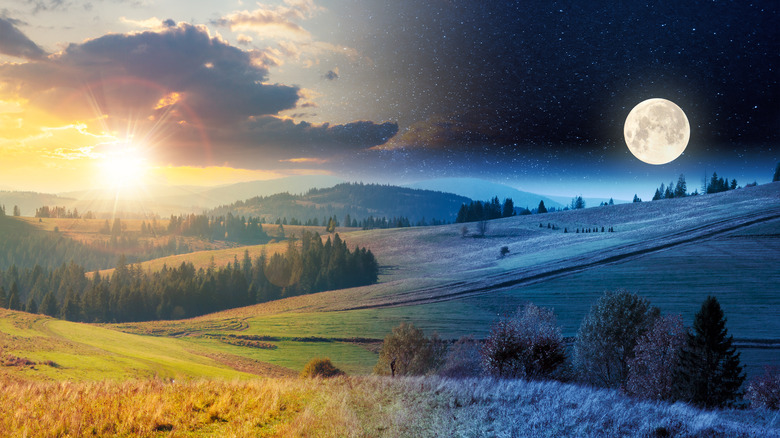How The Winter Solstice May Affect Your Body, According To Science
Resist all you like, but in the end we're just another form of animal life on a tiny spinning rock ball hurtling through an indescribably vast and dark cosmos. We're locked into terrestrial cycles same as the humblest mouse, gecko, or sparrow: ingestion (food and drink), respiration (air), excretion (poop), and of course, sleep. Sleep cycles are critical for the heart, immune system, healing, memory consolidation, and more. The slightest cyclical change disrupts the biochemical balance of diurnal (awake in the day) and nocturnal (awake at night) creatures, particularly when it comes to sunlight. After all, without that giant sphere of flame in the sky there'd be no life here whatsoever.
So what happens to a human body when it's deprived of light on the longest night of the year, the winter solstice? In our modified Julian calendar the solstice — recognized by ancient peoples and religions as a crucial turning point in the solar cycle — falls on December 21 or 22 in the northern hemisphere, give or take. From that day onward, the sun sets later and later until we reach the spring (vernal) equinox on around March 20 or 21. But around the solstice, you might feel sluggish, have headaches, experience hormonal imbalance, and be disinterested in sex. Serotonin and vitamin D levels will also be low. Overall, you might want to huddle in a dark corner like a hibernating bear and chill, rest, and think.
Annually sad in darkness
Feeling slow, sluggish, down, etc. — i.e., having a "low mood," aka unfocused affective state — on the winter solstice can be seen as a small manifestation of the type of feelings that many people experience through darker, winter months. Not that someone needs to feel peppy, sociable, and cheerful all the time — that would be weird and, frankly, unhealthy in its own way. Think of winter as a forced annual reminder to slow down, store up, and turn your attention to what can best be done at that time.
At their most extreme, the winter blues — as they're sometimes called — become an actual, classifiable, diagnosable psychological disorder called "seasonal affective disorder," or the appropriate acronym "SAD." As the Mayo Clinic describes, there are treatments available for SAD, like psychotherapy, phototherapy (exposure to artificial light), and medication. But please: Before self-diagnosing, understand that there's a world of difference between "feeling glum" and SAD, same as there's a world of difference between "feeling down" and being diagnosed with major depressive disorder by an actual psychiatrist. Just like wintertime itself, folks feeling down in darker months might just have to let it happen — and then arrive on the other side along with spring.
On that note, the winter solstice can be seen as an annual nadir, or the lowest point in the solar cycle of warmth, light, and growth. It's the darkest day, once a year, and it presages bright times to come.
A disrupted biochemical brew
Like we said earlier, the physiological and psychological effects of the winter solstice boil down to sunlight. Sure, winter is cold, and lots of people don't like the cold. But sunlight is a long-researched, essential contributing factor to human mental health. A recent study in Risk Management and Healthcare Policy published in the National Library of Medicine discusses this exactly and very succinctly concludes, "Humans may not survive healthily without sunlight."
Specifically, sun-emitted ultraviolet B — a bandwidth of electromagnetic radiation longer than X-rays but shorter than visible light — affects mood and health and produces vitamin D3. Notably, vitamin D3 influences the conversion of glucose into energy, bone growth, and muscular regulation. Too much exposure also increases skin aging and the risk of skin cancer, per the University of Texas.
And then there's serotonin, a neurotransmitter released through exposure to sunlight. Serotonin is a messenger that regulates a whole bunch of bodily activities through both the central (in the brain) and peripheral (throughout the body) nervous systems. It helps regulate numerous critical bodily functions, like body temperature, appetite, learning and memory, sex drive, and general happiness.
Of course, those living on the equator won't experience any significant change in sunlight throughout the year, and don't have to worry about limited sunlight on the winter solstice. For everyone else, winter trips to brighter climates are always an option.


